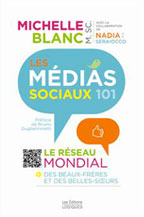Info en vrac ou tout ce que je n’ai pas eut le temps d’approfondir durant mes vacances
Parution d’un document sur la veille stratégique appliquée au tourisme (via Vtech)
Une liste exhaustive d’entreprises (principalement américaine) Web 2.0 et une liste complète d’API (Application Programm Interface) avec un tableau classant les plus populaires.
La suite de pourquoi il est si difficile de se désabonner d’AOL et de l’expérience de Vince Ferrari. AOL fournit un manuel expliquant à ses employés comment faire de la rétention de client. (via consumerist.dom)
Le copain Mitch Joël de Twist Image fait maintenant parti de la liste des 20 blogues les plus « influents » du marketing Web (pdf). WOW Bravo Mitch…
Seth Godin sur les blogues d’affaires des PME
So what if your company’s blog only reaches a few dozen people a day. If they’re the right people, the payoff is obvious.
Matt Cuts, le célèbre blogueur de Google, détruit plusieurs mythes de référencements dans ses premiers vidéoblogues.
• qualities of a good site.
• some SEO Myths.
• Optimize for Search Engines or for Users?
• Static vs. Dynamic urls
• How to structure a site?
• All about supplemental results
• Does webspam use Google analytics
• Google terminology
La controverse de Calcanis à propos du fait que les médias devraient payer les diggeurs (via n’ayez pas peur)
Second Life lance un magazine d’affaires SLBusiness et American Apparel y ouvre une boutique(via MIT Adverlab)
Le nouveau propriétaire de MySpace a changé la politique de propriété intellectuelle du site. Le chanteur Billy Bragg n’est pas content! (via International Herald Tribune)
Le Wall Street Journal sort une liste des maîtres des nouveaux médias
Ekstreme, un nouvel outil pour géolocaliser les hyperliens externes
Chez accesoweb, une bonne analyse d’outils statistiques gratuits et une enquête sur les fils RSS de demain
Tim Berners-Lee fait une sortie sur la neutralité du net, je lui envoie un commentaire et après deux semaines, il n’est toujours pas paru ! Peut-être étais-je hors propos ou tout simplement insignifiant? Voici d’ailleurs ce commentaire.
Dear Mr. Berners-Lee
I first want to thank you for the great gift you have shared with the world and to recognize that your country has been the birth place of a chain of technological breakthrough that has given us the Web has we know it today. We should therefore be grateful to you all. I also happen to be a dreamer and I know that sometimes dreams might develop into reality if a sufficient number of people share that same dream. To solve the problem of lack of regulations over the net, of state jurisdictions’ that collides with the geographical boundaries of other foreign states and to protect the neutrality of the Web, I have an utopia I would like to share with you. As you already know, the Web has no frontier, his share throughout the world, is the repository of what we could call the conscious and unconscious thoughts of many individuals that form a collective brain that is for everyone to share. The web has therefore become some sort of world virtual brain that should be protected and rendered available to everyone.
In our physical world, we also have had other world common territorial landscape that we collectively agreed to regulate and protect for the greater sake of freedom, science, commerce and the law. Namely, I am talking about the seas, the Antarctica, the celestial bodies and the Moon. All those world heritage territorial entities have been the subject of world treaties that regulates the behaviours that nations and individuals should obey by, in the spirit that we all share them and that they are for everyone benefits, within certain boundaries. My utopia is therefore this, why don’t we declare the web has a trans-national territory that could be regulated by a world treaty under a newly formed UN entity? It is certainly a long leap of faith but it also often is what dreams and utopia are meant for.
Pour plus d’info sur cette utopie : Plaidoyer pour un cadre législatif International régissant le web
Article publié le mercredi, 2 août 2006 sous les rubriques Blogue, Code-source libre, Innovation, Marketing Internet, Moteurs de recherche et référencement de sites Web, Outils et références, Technologies Internet, Tourisme en ligne, Veille stratégique et Internet et Web 2.0.












